Ai is not ready to replace me: The human element unleashed
Is AI going to take your job like some digital monster in an oncoming dystopian future? Maybe, not.
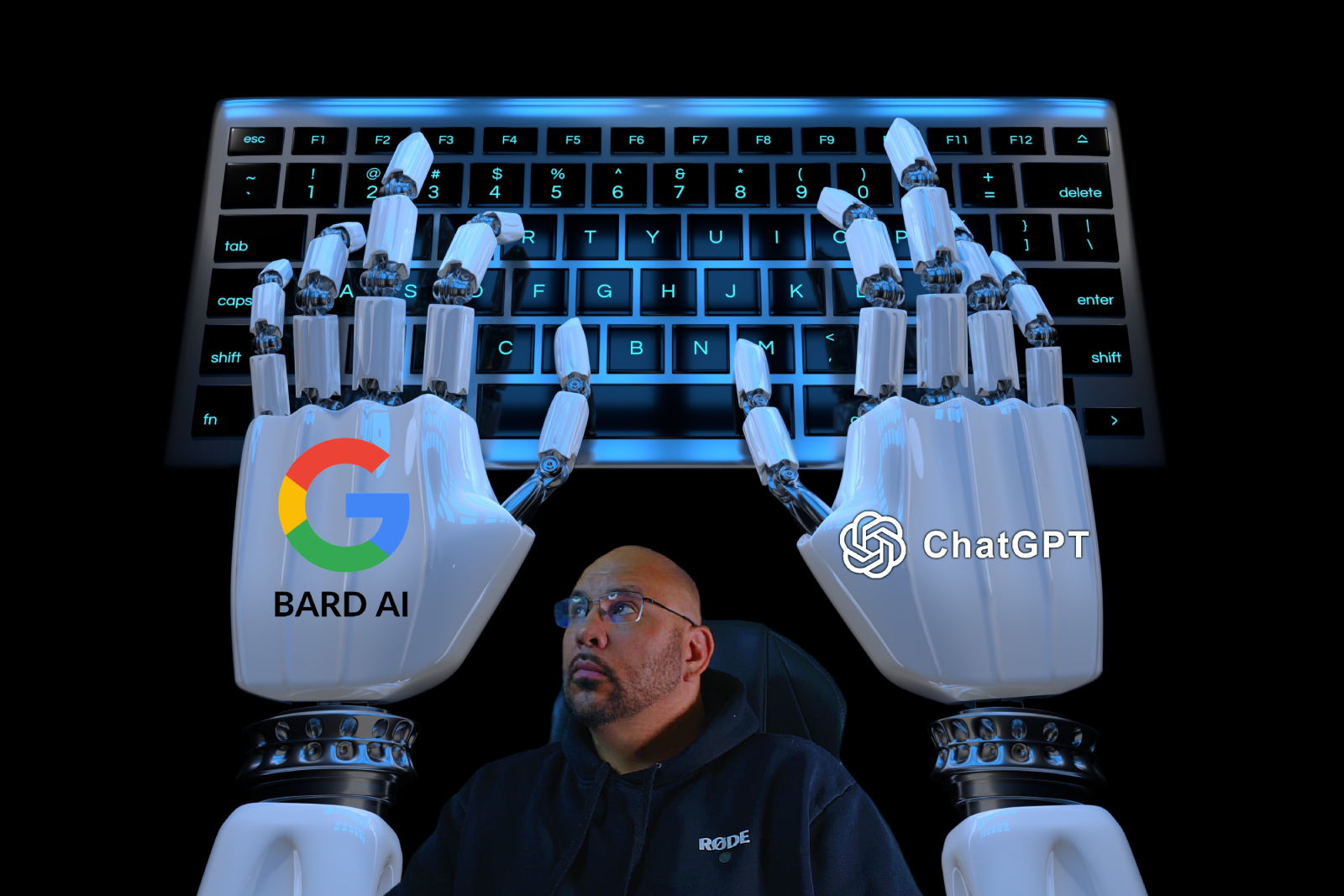
Sign up to receive The Snapshot, a free special dispatch from Laptop Mag, in your inbox.
You are now subscribed
Your newsletter sign-up was successful
Much has been made of AI technology, like ChatGPT and Google Bard being capable of producing written work on a par with journalists. Although we’ve seen several instances where both mostly copy and paste the result of human writers and even toss in a few false statements and misinformation, just about every publisher of digital content is using or testing AI to replace some its human workforce.
One afternoon after reading a horrifying article and going down the rabbit hole of how I’m about to be replaced, I fired up ChatGPT and Bard and tried to have it write several tech articles and news pieces. What I discovered put my fears at ease. And although I was impressed with both, I realized the power of the human element behind journalism is irreplaceable.
Over the last 150 years, each generation has faced and struggled with rapid technological advancement, and artificial intelligence is the latest incarnation transforming various industries. However, when it comes to the field of tech journalism and writing as a whole, the power of the human element cannot be underestimated. As a now seasoned tech journalist, I also have over 25 years of comedy and script writing in my back pocket. While AI-powered tools like ChatGPT have merit and can positively contribute, they can’t replace the critical thinking, creativity, and authentic human perspective I bring.
Analyzing Complex Information
Tech journalism, and writing in general, often requires delving into complex technical concepts and distilling them into palpable and engaging content for readers. ChatGPT and Bard can currently only regurgitate valuable information with a bit of style when using a human's work as its reference point. Generative AI technology needs more contextual understanding and gut intuition that only human writers possess.
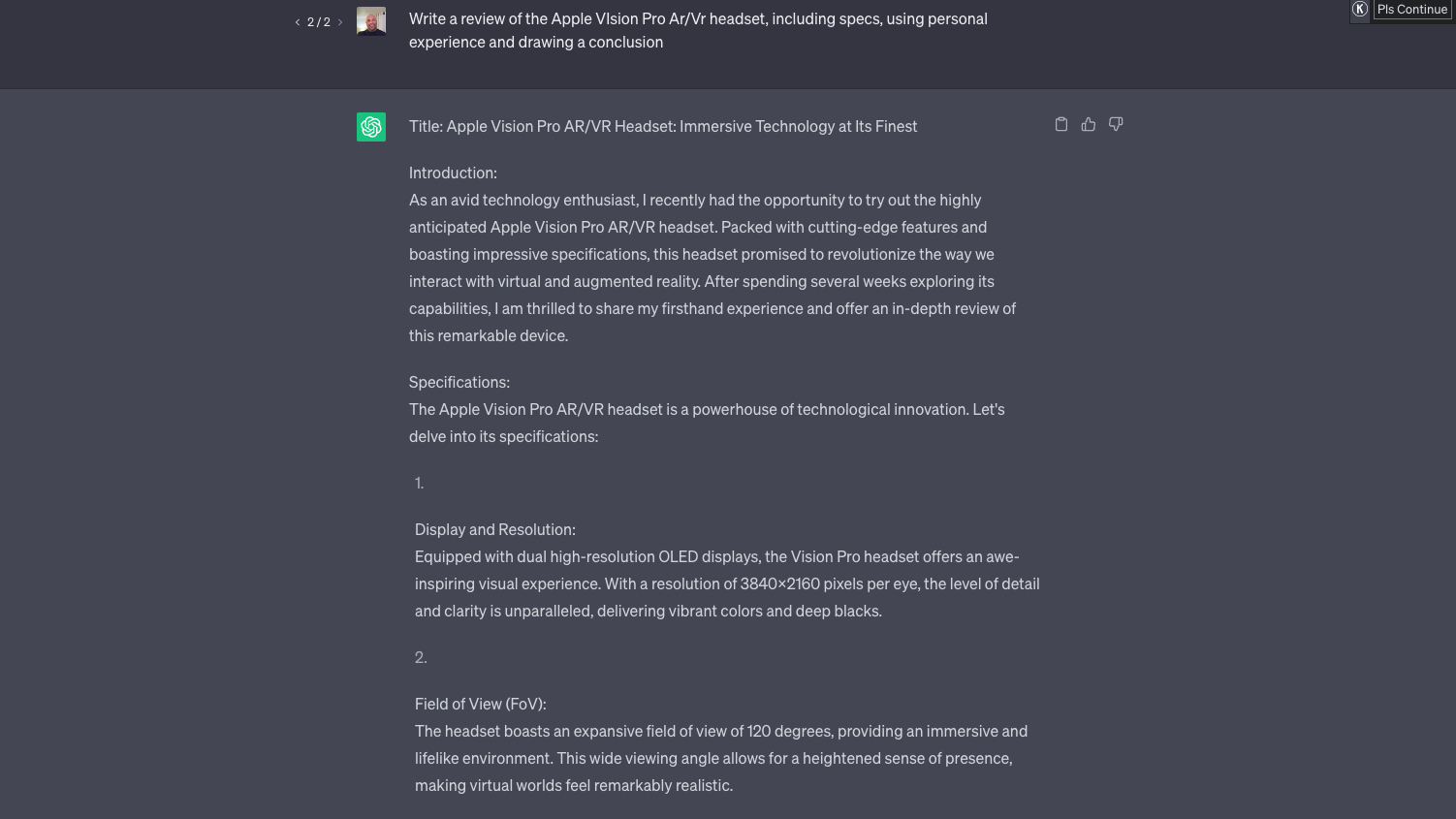
For example, I asked ChatGPT to write an article from its personal experience with Apple's new Vision Pro AR/VR headset. It proceeded to write a fictitious fluff piece, loosely based on what it gleaned from websites and human writers. The section on its personal experience with the Apple Vision Pro is a lovely piece of fiction, but it truly is a canard on a grand scale.
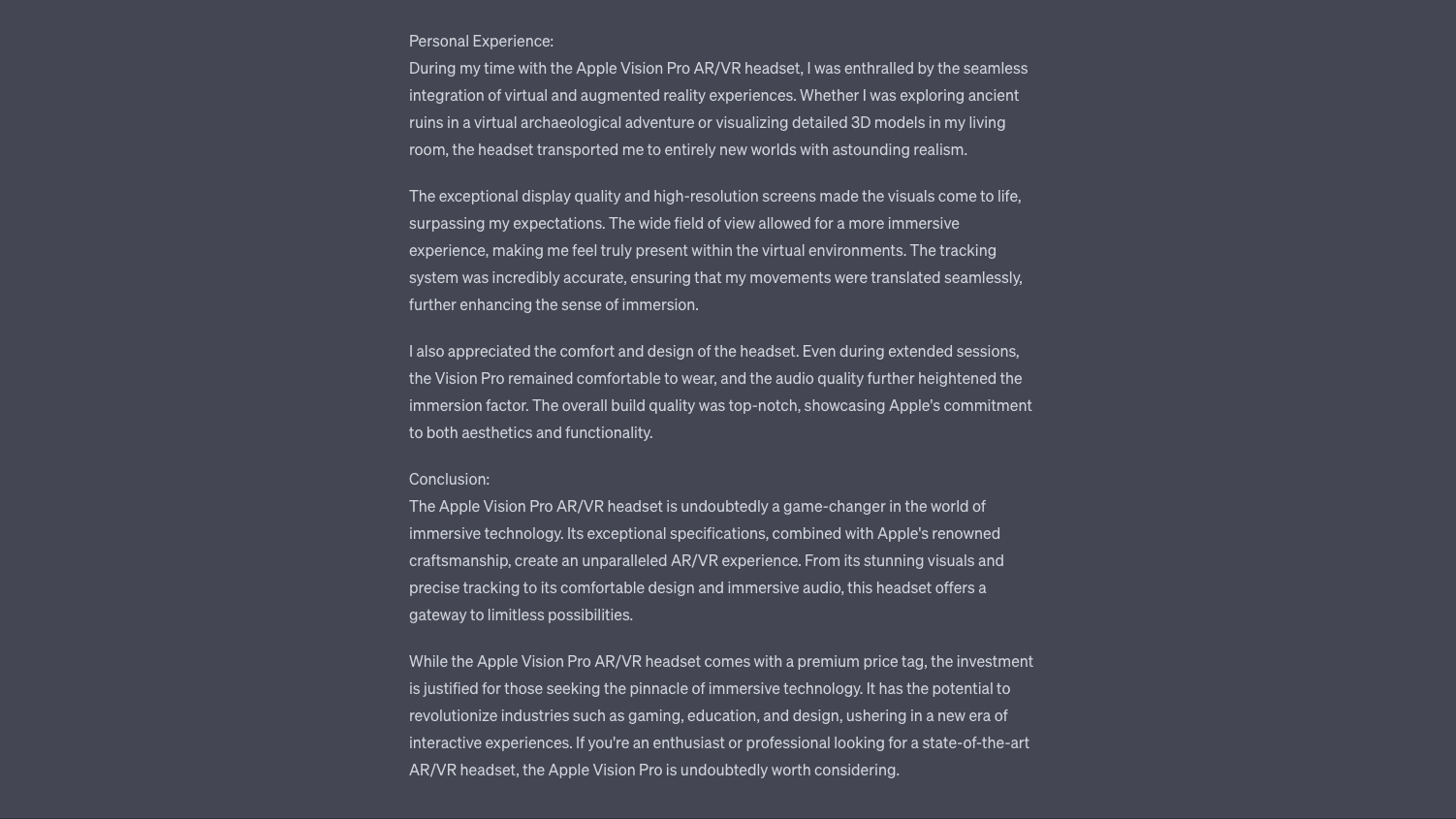
As a tech journalist and writer, I have spent years honing my craft to decipher complex information and observations of the world around me. I then do my best to interpret it all accurately while peppering it all with humor, seriousness, or the many shades of context that is the actual human experience others connect with. Writing is about creating a connection that resonates with readers.
Uncovering Stories
One of the fundamental aspects of journalism is uncovering and finding stories that resonate with the public. As a journalist, I do a lot of research, interview people, and analyze multiple perspectives and data to provide a comprehensive account of technology and events.
Sign up to receive The Snapshot, a free special dispatch from Laptop Mag, in your inbox.
The other human factor that I excel at is meeting with tech makers, PR, and marketing teams to build working relationships that keep me in the know of what new tech is coming. AI cannot get up, and fly to Taipei, North Carolina, and Las Vegas to meet with all these wonderful, hard-working people, bond with them and create a connection that fosters sharing of information and building of friendships. Once again, the human element is just far too important to try and eliminate.
Respectfully, I admit that while Bard and ChatGPT can process vast amounts of data, it lacks the ability to conduct in-depth interviews, establish trust with sources, and understand the nuances that shape a story or get hands-on with a new piece of tech to review it. As a tech journalist, my ability to form connections with industry insiders, uncover hidden gems, and present engaging narratives that readers connect to on a deeper level. Honestly, it’s my favorite part of the job, learning that our tech giants and heroes are just human beings with families, hobbies, and concerns. They leverage all of that to create the best products possible that resolve day-to-day issues.
Interpreting Trends and Impact
As a tech journalist, I have learned that it’s not just about reporting the latest gadgets or software updates; it's about understanding the broader implications and impact of these advancements on society. I possess the acumen to analyze trends and patterns in real time, and identify their socio-economic impact, ethical consequences, and present my balanced perspective, with a hint of sarcasm and humor thrown in. Sure ChatGPT and Bard can collect data faster than a speeding bullet, while offering up statistical analysis.

However, it fails to comprehend the human aspect and the effects technology has on consumers, which is vital. Also running a simulation of the latest Zelda game or Assassin’s Creed is not the same as having the controller in hand and slaughtering thine enemies with the haptics vibrations giving you that exhilarating feel of conquering.
It’s not all games, this job requires critical thinking
As I mentioned, tech journalism requires more than regurgitating facts; it demands critical thinking and emotional intelligence while creating a context that allows readers to make informed decisions. While Bard and ChatGPT can generate coherent text, they lack the ability to evaluate information critically and discuss the feel of a game or device with a full understanding of what it is to actually feel.
For instance, I had Bard write an article comparing Apple's iPhone 14 Pro and the Samsung S23 Ultra. I asked it to use the specs in the comparison and give a definitive conclusion as to which is best.
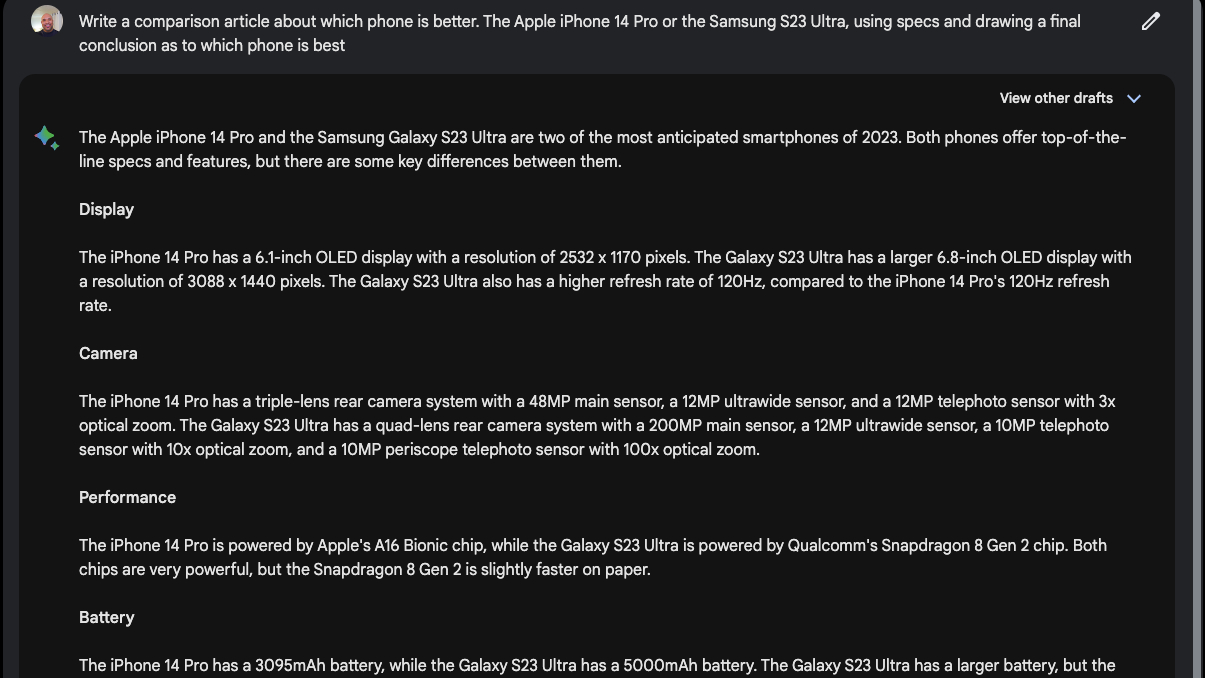
It simply regurgitated the specs and used the information it copied from human writers to state which one was more battery efficient. Still, ultimately it could not choose a victor or state a preference. It gave a politically correct, "Ultimately, the best phone for you will depend on your individual needs and preferences" conclusion. Again, that is true, but not having a personal element or an experienced-based personal choice to share or write, "I prefer the iPhone for this reason, but ultimately the choice is yours." That makes a huge difference.
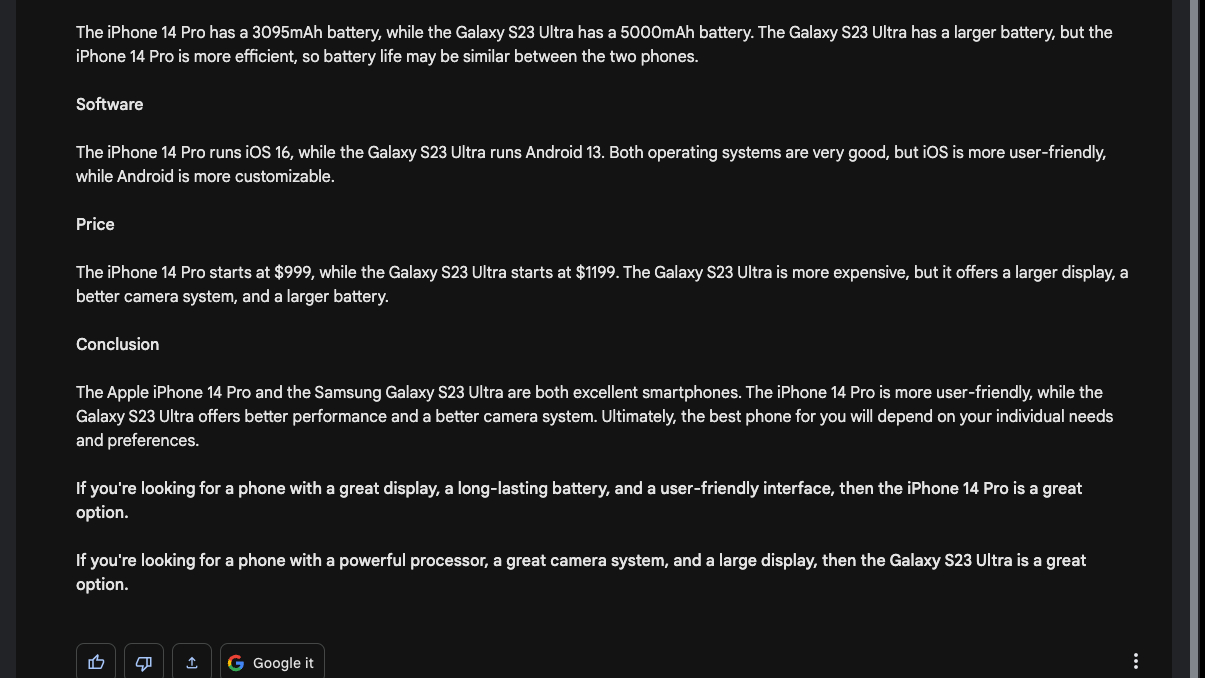
Again, that is true, but not having a personal element or an experienced-based personal choice to share or write, "I prefer the iPhone for this reason, but ultimately the choice is yours." That makes a huge difference
Currently, generative AI lacks the ability to consider multiple viewpoints and adapt to evolving circumstances as data and humans often change things up unexpectedly. As a tech journalist, I can offer insights based on experience, challenge prevailing notions, and try to spark conversations that push the boundaries of technological discourse or cause arguments in your parents' basement or around the dinner table.
Authenticity and originality matter
In an era where misinformation and fake news run rampant, the role of trustworthy, authentic tech journalism is indispensable. Readers rely on journalists to provide accurate information, sift through biases, be entertaining, while maintaining the integrity of the profession. While both Google Bard and ChatGPT can mimic a journalist's style, it lacks human authenticity that stems from genuine human experiences and perspectives those experiences create. As a tech journalist, I can relate to readers on a personal level, inject my own voice, and build trust through genuine connections.
Whether people realize it or not, just as much as you care about the latest tech, we care about bringing it to you, not only with all the data and information you require, but with the touches of humor and heart that bond us all.
Final Thoughts
To summarize my experience, Yes, AI-powered tools like ChatGPT and Bard have their place in enhancing productivity and automating certain aspects of tech journalism. But what they lack, and can never fake, ultimately is the actual emotional intelligence it takes to build the bond that our words, through actual experience can share.
ChatGPT and Bard can never fully replace the value that a human tech journalist brings to the table. The ability to interpret information, uncover stories, bond with tech makers and their teams, analyze trends, think critically, and provide authenticity, that human element that is indispensable to tech journalism. As a tech journalist, I see the potential of AI but recognize that I’m irreplaceable. The role I play in offering a unique perspective that resonates with readers, that human element, the humor, the depth of my character, elevates the field and creates human bonds, through words, that create feelings. That my friends, is the gift and joy AI cannot yet recreate.

Mark has spent 20 years headlining comedy shows around the country and made appearances on ABC, MTV, Comedy Central, Howard Stern, Food Network, and Sirius XM Radio. He has written about every topic imaginable, from dating, family, politics, social issues, and tech. He wrote his first tech articles for the now-defunct Dads On Tech 10 years ago, and his passion for combining humor and tech has grown under the tutelage of the Laptop Mag team. His penchant for tearing things down and rebuilding them did not make Mark popular at home, however, when he got his hands on the legendary Commodore 64, his passion for all things tech deepened. These days, when he is not filming, editing footage, tinkering with cameras and laptops, or on stage, he can be found at his desk snacking, writing about everything tech, new jokes, or scripts he dreams of filming.










